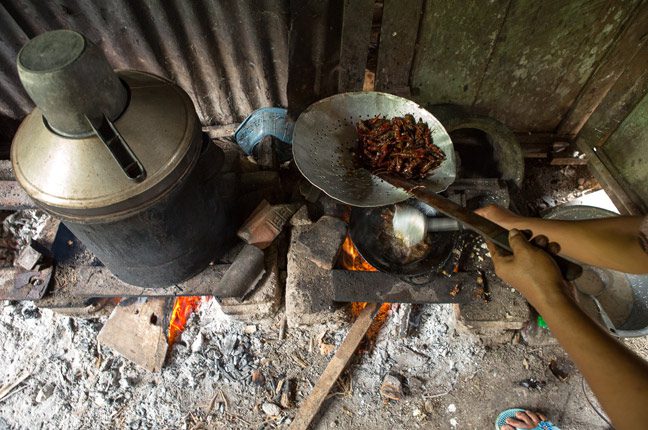
HELP SAVE LIVES
Right now Oxfam is responding to emergencies around the world, including the recent earthquake and tsunami in Indonesia.
The disaster, the muazin and the fried grasshopper
By Juan Martorana – blogging from Indonesia
This post should be titled “disasters”, plural, not disaster, singular. The last couple of days have been spent on a brief side trip from my primary mission to collect stories about some of Indonesia’s female food heroes. This diversion was to gather stories around Oxfam projects that build resilience to natural and other disasters by reducing risks faced by villagers in Lombok Utara and Timur (North and East Lombok). Flash floods, fire, drought, “whirlwinds” (as they are known here), landslides and the potential for earthquake and volcanic eruption are just some of the 14 threats identified by the local disaster management authority on this smallish island east of Bali.
Not surprisingly, the issue of access to food came up regularly. From widowed single mums struggling to feed their families at any time, through to a story of 400 people perched on a mountainous ridge above their village of Koko Nangka following flash flooding: a ridge on which they waited under plastic for almost two days before the army could reach them with food and other supplies.
It seems wherever you look in Indonesia there’s a food story to be found. What struck me around this side trip, however, was that it underscored what I had just been hearing from the female food heroes in Jakarta: that local problems need local solutions. And that community involvement, including importantly the involvement of women, is crucial to successfully understanding and implementing solutions that meet the needs of all community members. Top down decision-making often fails to understand the extent of a problem. Or sometimes, even that a problem exists. As a result, top-down “solutions” often fail to meet the needs of many people. Women — who have traditionally been marginalised and shamed if they spoke out — are often high on this list.
The alternative is to take a consultative approach. What I heard from representatives of Oxfam partner organisations (Konsepsi and Koslata), from villagers that make up the local disaster preparedness teams, as well as directly from Abdul Hakim, the Head of Lombok Timur District Disaster Management Authority (BPBD), was that building links between communities and the BPBD was leading to substantial reductions in risks and negative impacts around disasters in Lombok. In short, involving local people with local knowledge was saving lives: reducing economic losses, damage to people’s livelihoods and increasing food security.
Suparjiyem, one of Indonesia’s female food heroes, believes a similar approach is needed to increase the availability of food in her district.
Where does the fried grasshopper come into it? Well I had my first fried grasshopper today at Suparjiyem’s house in Wareng village, south of Yogyakarta. I’m told by our translator, Irwan, that in the past the grasshopper attacked the crops, so now the villagers in Wareng attack the grasshopper (and eat it) as a local delicacy. It’s an example of local foods creating local food security.
And the muazin – the caller to Muslim prayer? He just sounded good echoing around the village from various loud speakers at dusk as I typed up this blog post.
How does one female farmer harvest around 250 square metres of rice in just two hours. Find out next post.